First Up: Sam WilliamsGah—I’m so uncomfortable. How in the world am I supposed to choose the Best. TV Show. Ever!? An 80-year-old should be sitting on this couch, on this laptop, half-watching Spongebob, and writing this article instead. An 80-year-old would have so much more knowledge. I’m still working on my 10,000 hours watching of TV’s best. See, I wasn’t allowed to watch TV during the week when I was growing up. And I wasn’t allowed to watch adult shows (not porn, but something like Lost) until I was 18. Until I reached that draftable age, I watched mainly cartoons—hence the Spongebob watching at the moment—and sports, which I still watch a lot of. Come college, I had my pick of TV shows to watch. What was it going to be? Cheers? Friends? Parks and Rec? BREAKING BAD? Nope. I chose to watch Family Guy all the way through (like 8 times in a row) before I moved on to watching American Dad. Short anecdote: my then-fiancée (now my wife) introduced me to Family Guy, thinking that’d I’d enjoy it. Now, it’s basically banned from the house (apartment). I only recently starting bingeing pretty much everything I can. So I have seen A LOT of TV since graduating from college in 2014. Yet I still feel that an 80-year-old who thinks of Mork & Mindy as newish TV would be a better judge. That person has seen so much crap and so much good TV too. I wonder what they would pick. The Rules:
THE “WHO I HAD TO CROSS OFF, BUT REALLY WANTED TO CONTEND” CATEGORYParks and Rec. Parks and Rec is probably the best workplace comedy of all time. It’s funny, insightful, and has got a killer cast. I mean, come one! Amy Poehler, Adam Scott, and Chris Pratt? It had this ability to make you laugh while pointing out strange social conventions or the wildness of the political scene. Even their future 2017 jokes were funny, though it’s strange to see that even in a dramatized comedy, Parks and Rec 2017 wasn’t nearly as weird as real life 2017. The trouble is, Parks and Rec is among a slew of workplace styled comedies. It follows the immensely popular Office and other rip-offs, so as per Rule 3, I had to take it off. American Dad Biting, weird, hilarious, dirty. All of these things apply to the best The Simpsons-like Cartoon (I’m not putting Rick & Morty in that category). It helps that their Stewie character, Roger, is an alien, making his explicitly sexual jokes less uncomfortable, as compared to when a toddler delivers the same on Family Guy. But it follows the trend of The Simpsons and such. So, off it comes. THE “IT’S TOO EARLY TO TELL” CATEGORYThe angst. The visceral reactions. The willingness to go there. Rick and Morty proves unafraid to do anything, even break TV rules. I mean (SPOILERS) in season one, Rick and Morty turn everyone on the planet into giant insect-like creatures who want to have sex with and then kill Morty. They end up “fixing” this with, what would otherwise be, a cheap trick—going to another universe where they’re dead right before the events of the episode. The jokes, the creative outlook on science fiction, and the commentary on the modern family life make this show just fantastic. It’s too early though. Rick and Morty is only 3 seasons in. In comparison, it took a while before The Simpsons and Family Guy became our favorite versions of those shows and of course, both those shows changed over time, leading to them not being in contention to this list. Westworld Our first J.J. Abrams inclusion... Some people liked the “Space Cowboy” thing called Firefly. But everyone likes the having sex with cowboy robot thing! Seriously though, Westworld has woven into it’s story a 1984-like approach. We have to ask ourselves questions about what the future is going to be like and how we want to approach artificial intelligence, crime, and business ventures. What’s amazing to me, is that through all the sex, violence, and mystery, the first season of Westworld still managed to be about dealing with our emotions and our freedom. Excellent show. But it is only in its first season, so, you know, too early. THE “I’VE NEVER SEEN IT BUT I’VE HEARD IT’S GOOD” CATEGORYList time:
THE “CONTENDERS” CATEGORY... finallyHere’s quick hits on all the Contenders on why they’re good, but why they didn’t win. Cheers: Heartfelt, and well-acted. Cheers became a place you wanted to visit everyday too. Why it didn’t win: It was on too long and the storylines towards the end felt repetitive. Friends: I mean, this is probably the greatest TV show of all time. Witty, funny, Jennifer Aniston, “How you doin?” “Smelly Cat!” Ah, so good. Why it didn’t win: Such solid writing in this, it almost did win. It was that close to winning. It’s hard to find fault with any of the major storylines. What ultimately made it a third place holder was the use of a laugh track (which I detest) and some gags that didn’t age well. Batman: The Animated Series: Scoff if you will, but this is the best written superhero show and best written children’s TV show. The narrative surrounding Batman’s struggle to be Bruce Wayne and the absolutely riveting voice acting from Mark Hamill as the Joker make this the premier classic 90s cartoon. Why it didn’t win: The normal faults of superhero plot points, plus some super cheesy dialogue. Game of Thrones: Keeping you on your toes! At least for the four first seasons. It’s amazing that once GoT started winning Emmys, they stopped showing so much nudity. My goodness, they really injected nudity in the first season. It feels like the producers put the nudity in to capture male attention. Can’t you just hear the producers, “If we have a ton of hot chicks naked, a lot of guys will watch right?” “Well, they watch Bravo without the nudity, so yeah, that should work.” Why it didn’t win: Really, the writing during the past season felled this show. Game of Thrones season 7 felt like the writers were pressed to get places in the plot quickly, so the characters had to get to places physically quickly. Too quickly, and even the casual fan was like, “HOW DID A RAVEN FLY FROM THE WALL TO DRAGONSTONE IN ONE NIGHT?” Dr. Who: This show was going to win. It’s the longest running show ever. It has a great mix of campy and serious. It’s lovingly fun and bizarre and the David Tennant episodes are the three best seasons of TV I’ve ever seen. Why it didn’t win: These most recent seasons with Peter Capaldi—whom I love as an actor—have been poorly written. The main companion for Seasons 8 and 9 was over important. It took forever for Steven Moffat and Co. to find Capaldi’s Doctor “moment.” The show tried to get more serious and became too dreary. Lost: The mystery behind the bunker, the monster in the woods, and who would win the love triangle between Jack and Sawyer: it was all so compelling! The first two seasons of Lost rank up there as best seasons ever. The next four? Eh. Why it didn’t win: Too many loose ends! The mysteries were so good, it was hard to do satisfactory reveals. Plus, the sixth season made it feel like what happened in the fifth season didn’t matter. Archer: This was the show I was going to pick until I remembered the actual winner. Archer is smart. It’s incredibly crass, but smart. The jokes are creative, the action is actually interesting (and not just for a cartoon), and it’s just interesting action. Period. Archer made the decision to have continuity, unlike most animated shows, meaning those really funny/really bad Ray in a wheelchair jokes can keep happening. It also means the show can tackle issues like raising a child. Plus, Archer is one of the best-written characters on television. You hate him and love him and root for him even though he really should be in rehab/jail. Why it didn’t win: Ask me tomorrow and I might choose Archer over [redacted]. I love this show. New Girl: Incredibly funny and very relatable to my generation. Schmidt and Jessica bring this show to a whole ‘nother level. Why it didn’t win: Lately, it feels like the show really belongs to Schmidt (like how Chandler and Monica owned Friends for a couple season), yet this past season really amped up the Nick/Jessica relationship instead. Gilmore Girls: The best show to watch during autumn. Lorelei and Rory bring a much needed soft drama to the world. The show is the epitome of cozy. And the navigation of adulthood, childhood, and mother/daughter relationships make this one of the all-time best-written shows. Why it didn’t win: The whole Lorelei eloping with Chris thing is something that I will never get over. It felt forced, rushed, and made to amp up fan interest. THE “WINNER” CATEGORYSherlock: What makes Sherlock great is that it doesn’t oversaturate the viewer with Sherlock Holmes’ quirks. Unlike the Big Bang Theory, which hits you over the head with how strange Sheldon is, Sherlock gives you doses so it doesn’t become tiresome. Of course, having Benedict Cumberbatch as your lead actor with Martin Freeman as your sidekick also helps. The time allotted to each episode also helps. It gives the show freedom to accomplish what a show in 40 minutes has to do in an hour and a half instead. The narrative elements of this show rely on the introduction of a mystery or problem, the bits of Sherlock’s quirks, the normality that Watson brings, the thrill of the chase, the problem solving skills, and the reveal of the solve. What the writers accomplish in this show is a sense that Sherlock can be beaten. They continually surprise their viewers with how Sherlock solves or beats his adversaries. And yet, the show isn’t about the mysteries; those mysteries are a plate to give us the dish that is the Sherlock/Watson relationship. Pitting against each other and with each other, we get to watch Watson, a normal man (in other words, us the viewers) ride alongside an extraordinary individual and witness extraordinary events. That’s what attracts such a large following and that’s what makes Sherlock so great. Next Time...I’ve been writing about depression ever since I was diagnosed with it at the age of nineteen. Perhaps, attempting to write about depression is more accurate. After I saw a doctor at the Oregon Health and Sciences University in Portland, Oregon who prescribed me Fluoxetine (more commonly known as Prozac), I began a ten-year journey through prescription medications, self-medication, therapy, and writing. I basically began writing to comprehend my own brain, my own melancholy, and my experience in the world. I would write to piece together (in a sort of cognitive behavioral way) why I do the things I do. Writing acted as both catharsis and therapy, but it also provided me with a reason or meaning to endure the elements of life, including depression. “Sure,” I would think, “I’m depressed because the world is fucked up and some traumatic things have happened to me, but I will write a book about it and redeem said darkness!” However, as I began to work on a sort of memoir about depression and my life, I discovered that the subject is nearly as impenetrable to the writer as the cure is elusive to the sufferer.
Why is it that this strange illness that afflicts 1 in 5 Americans gets very little portrayal in books, movies, and essays? Perhaps because depression is, unfortunately, the least narrative based mental health disorder or illness. Depression is static, stagnant. Bipolar disorder has exciting, if troubling, manic swings. Personality disorders a cacophony of voices and unreliable narrators. Anorexia visceral and physical descriptions. Depression is the equivalent of photo negatives. Characterized more by what isn’t there, than what is—i.e, no color, no light. Everything more shadow-like, Stranger Things upside-down-like, wraith-like. The other trouble with depression is it’s not exactly a topic that shouts “MUST READ” or “BEST SELLER!” I learned this in a particularly harsh way when I tried to pitch my book to agents in New York as part of a writing conference. One agent summed up my pitch by saying to me, “That sounds depressing.” Another one of these New York agents told me that depression should be the subtext of the narrative and not the narrative itself. I understood their points, reading about depression is depressing, and yes, maybe more of a subplot than the actual plot (i.e., maybe that’s part of the problem); however, wasn’t that the point? I wanted to write a book that people who struggle with depression in daily life could relate to rather than focusing on sensational, un-relatable stories. But these agents were right to some degree—depression’s not a topic you can tackle head on for a variety of reasons. Depression has no narrative arc. This lack of narrative arc therefore stymies a book about depression because you end up overwhelming and, ultimately, depressing your reader. There is no story arc, no plot twists. It just is. The main difficulty with writing about depression is that you cannot write about it directly. It is too easy to fall into the “mimetic fallacy” in which the attempt to convey an emotional state mirrors that state in writing too closely and leaves the reader confused, foggy, and ultimately, depressed. It’s challenging to imitate depression through words, i.e., “A black wave descended over me in a fog of mist and confusion which then threw me into an abyss of which there was no escaping” might sound decent in an emo kid’s journal, but it’s really all just abstract sentiment that means nothing. Therefore, a horror film such as The Babadook becomes a better medium for portraying depression because it is an illness best described through metaphor and symbolism, poetry and fiction. The other difficulty writing about depression is that it cannot be isolated. It is cognitive, neurological, physical, and personal. Rooted in one’s life experience, personal history and view of the world, as much as in brain chemistry. Which is why the best methods of dealing with depression are holistic and include some combination of therapy and medication. Depression is complex. The thread of darkness is not easily found. “Scientists are gaining a more nuanced picture of what depression is,” says Mandy Oaklander in the cover story for a recent Time Magazine article titled “New Hope for Depression.” It’s not a “monolithic disease,” she says, “but probably dozens of distinct maladies—and they’re getting closer to learning what works for which kind of ailment.” There hasn’t been a major breakthrough with regard to treatment of depression in years and suicide in America is the highest it’s been in thirty years. “Depression is your body’s way of telling you that you need to deal with something,” says Dr. James Fadiman, one of the foremost researchers of psychedelics. Fadiman says that LSD and Psilocybin can be helpful tools for depression because they make you feel just good enough to deal with things in your life that you might not be dealing with. There are other means of writing about depression besides literature of course. Music is perhaps the best medium for writing about depression and it must be one reason why I am always drawn back to melancholic indie bands of the late 90’s and early 00’s. Artists like Kendrick Lamar are changing this though, as his two latest albums--To Pimp a Butterfly and Damn—reference depression extensively. Rap artists like Tyler the Creator and Earl Sweatshirt are also tackling topics of mental health, agoraphobia, and inner emotional distress. Another medium besides music might be that of comedy, because really at the end of the day, what else can you do but laugh at the whole situation? There’s even a podcast called “The Hilarious World of Depression.” Patton Oswalt, Paul Gilmartin, and Chris Gethard also reference depression and mental health and comedy in their various specials, shows, and podcasts. Although, in a way, comedy is just another method of distraction and avoidance. What started with some minor melancholy and Seasonal Affective Disorder became more serious, chronic depression for me. Life, all of it, began to grate on me. Like Michael Keaton says in the film Birdman, I felt like life was constantly “hitting me in the balls with a tiny little hammer.” I experienced the death of any and all of my romantic expectations for marriage, life, my writing career, or the world in the general, hiding behind bottles of whiskey and packs of American Spirits, small trips to the grocery store feeling like expeditions to Mt. Everest. I ultimately discovered, however, that there would be no “one” miraculous thing that cured my depression as much as I wished for it to, whether it was in the form of literary fame, science, religion, or, sadly, psychedelics. The best way to manage and contain this black disease is a combination of all of the above. Medication, therapy, love, music, meaning, purpose, and perhaps spirituality or psychedelics depending on what you’re into. But there is no one cure. Depression is like finding out you have a disease that may or may not have a cure, but that if there is a cure, it’s some strange voodoo remedy that involves stirring a bunch of ingredients into a smoldering cauldron. You then throw everything in that cauldron against a wall and hope something sticks. Then, after some experimentation, you hopefully find the things that make the most difference and incorporate them into your life. However, now I know that even if I never publish a memoir on depression, there is a sense that the goal to understand, to cathart, to resolve through art, gave my depression—and hence, my life—a purpose and a meaning I would not have had during the last five to ten years without it. And in this sense I think I can say, while I may have never successfully written about depression, writing has helped me successfully deal with my depression, and for that, I am, at the very least, grateful. |
AuthorOur fabulous blog team Archives
June 2024
CategoriesAll 12 Songs Art Art And Athletes Book Review Chorus Blog Date This Book Game Of Narratives Guest Blog Letter From The Editor Lifehacks Movies Of 2019 Music Pup Sounds Smackdown Strive For 55 Summer Playlists |
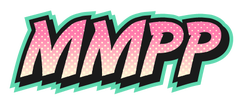
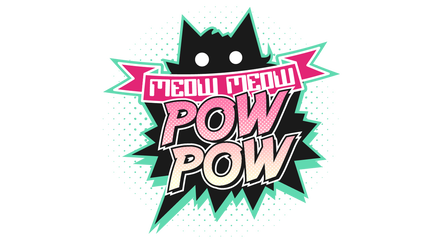
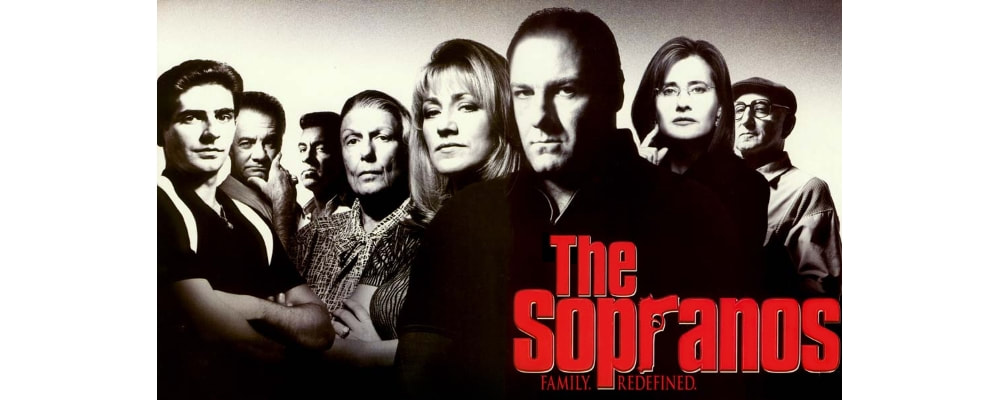

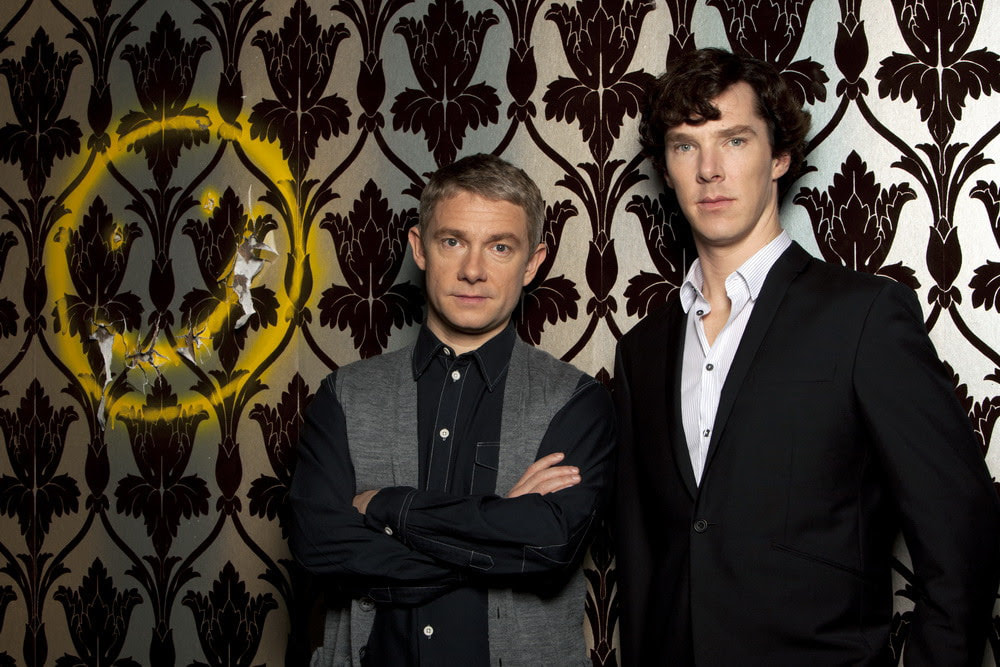
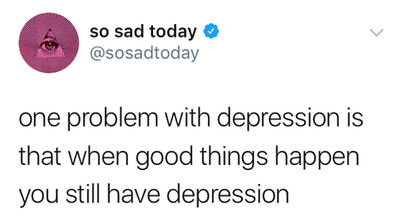

 RSS Feed
RSS Feed